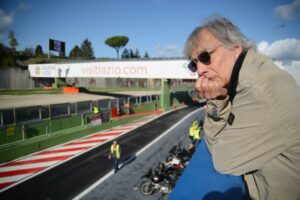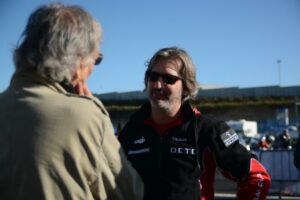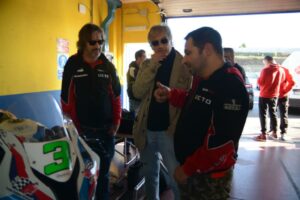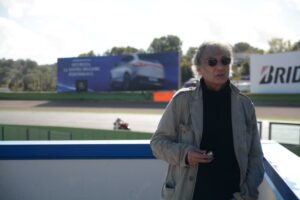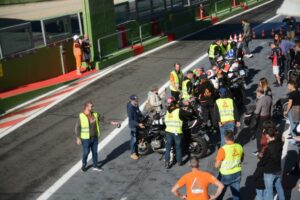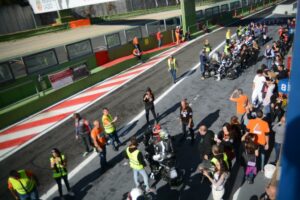The Triumph of Will
The air is fresh and invigorating. It rained throughout yesterday, but today, the sun is shining, and the sky mirrors the intense blue typical of Roman October days. Valentina, my friend and photographer who will capture the moments in this diary through images, and I are on our way to the Vallelunga “Pietro Taruffi” circuit in Campagnano di Roma, near Bracciano. We’re attending an event organised by the Di.Di. association. But what exactly is this event, and what is Di.Di.?
Di.Di., an acronym for Diversamente Disabili (Differently Disabled), stands as a unique non-profit organisation in Italy, fighting for a decade to enable individuals with disabilities to engage or re-engage with the world of two-wheelers. They strive to overcome bureaucratic and logistical barriers that hinder the fulfilment of a desire that is also a fundamental right. Di.Di. has undertaken initiatives to promote sports activities as a social and rehabilitative element for young people with disabilities. They offer driving courses with adapted motorcycles, instructing pilots who share the same disabilities as the participants. This is aimed at obtaining the Special A license, facilitating the disabled’s reintegration into society through mobility. Additionally, they organise the world’s first and only championship recognised by FIM Europe, featuring disabled riders from 12 countries. Di.Di. conducts Road Education courses for schools and provides Motor Therapy paths for paediatric oncology departments in hospitals. In essence, they are a fantastic group of men and women, mostly disabled, filled with enthusiasm and boundless ideas. I like to think of them as individuals unfamiliar with the term “surrender,” gripping onto the challenges with tenacity. Heroes in the noblest sense of the term, whom even Sophocles would have admired.
Among the numerous initiatives I briefly listed, there is today’s event: the Di.Di. Day, a day of sharing and solidarity, allowing people with disabilities to experience the thrill of speed as passengers on motorcycles or in cars, accompanied by professional drivers, all free of charge. The paddock square is bustling with activity. There’s a booth for registering participants, vehicles are being unloaded from trucks, and the program is being fine-tuned in the pit boxes. As we are not directly participating in the event, we head towards the track. The goal is to have a conversation about my project with Emiliano Malagoli, the president of Di.Di., whom I had previously contacted via email. Understandably, Emiliano is currently occupied, so we approach two guys from the staff who are engaged in conversation. One thing that has always struck me: you can recognise disabled people from a distance. Perhaps it’s because they share the same difficulties, attempt to overcome the same problems, and fight the same battles. We introduce ourselves to Michele and Corrado, nicknamed Dado, two disabled riders who share my same challenges – Michele with his right arm, and Dado, like me, with his left. We start chatting as if we’ve known each other for a lifetime. I ask many questions and express my fears and uncertainties. We discuss vehicles, devices, trajectories, setups. I mention that I don’t know; many years have passed, and I fear I won’t remember anything, that I’ll end up with a machine I’ll never connect with again. Dado laughs, reassuringly saying we’ve all been through that, but in the end, it’s like riding a bicycle: things you don’t forget. Indeed, why don’t you put on a suit and take a few laps? I shiver. “Dado,” I say, “unfortunately, I’ve just finished four months of oncology therapy, and I’m still recovering my strength. I wouldn’t be able to handle 200 kilos of equipment. However, please don’t suggest it a second time because I might set aside all inhibitions and make a reckless decision”. We laugh. Fortunately, a sense of responsibility prevails. They invite me to the pit boxes to show me their racing vehicles. The scent of gasoline, mechanics at work, engines warming up. Dado has a BMW, and I believe Michele has a Yamaha. I extol the virtues of the low-end torque of a twin-cylinder. There’s nothing to be done; motorcyclists may be a unique and very elitist tribe, but within it, each has their own totems. I ask Dado to explain how the lever works on the right handlebar to control the clutch and other technical aspects. However, the event is about to begin, and they have to go. We say our goodbyes: they head to the track, and we go to the spectator terrace.
Motorcycles with their riders line up on the acceleration lane. There’s an atmosphere of joy and excitement. The passengers arrive, most of them in wheelchairs. Each has a dedicated team. They are placed on the seat, secured to the rider. They wear leather suits and vibrant helmets through which wide-eyed gazes look around in wonder. Final instructions, the engine revs increase. Then, one after another, the motorcycles enter the circuit. They start. They zoom by. Lap after lap, turn after turn. Finally, they return to the paddock, and that’s when you realise what has truly happened. Bright eyes, flushed cheeks, heartfelt laughter. People with disabilities of all ages, males and females, hug each other happily. No, I will never truly understand what it feels like after spending a lifetime moving slowly, battling against architectural barriers, the incivility and indifference of others, to see the world rush by at insane speeds, reduced to formless splashes of color with the wind whipping your face. Unbelievable.
We return invaded by a strange and unexpected happiness. Perhaps now, taking advantage of a break, I can exchange a few words with Emiliano. I ask a girl I discover to be Chiara, his wife. She points him out. I go over. He asks me to briefly remind him of the terms of the matter. But this is not the time to dwell on it, and we schedule a phone appointment in a few days. Emiliano is a nice, solar guy full of energy. Mission accomplished, and we retrieve the car from the parking lot. But the day is not over yet. The weather is perfect to find a tavern and have lunch by the lake. After so many emotions, even the palate wants its share.
